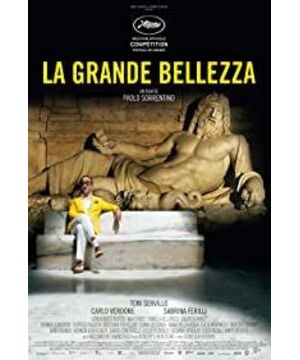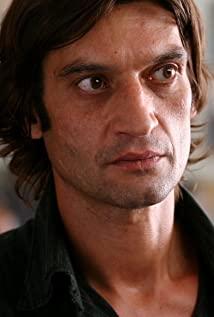Before explaining, you need to understand, before you understand, you need to understand, and to understand, you are afraid of misunderstanding from the beginning. The Chinese name of the movie "The Beautiful City" is actually inaccurate. "La grande Bellezz", "The Great Beauty", literally translated "absolutely beautiful", there is no "city" position. The story of the movie takes place in Rome, and Rome is indeed beautiful, but this movie is not about the beauty of Rome. This movie is about beauty itself.
When I watched it for the first time, the whole movie was a mess of life fragments of the protagonist Jep Gambardella. Only the reappearance of the theme music seemed to outline the dark lines, connecting the parts. The story spread to almost one place, the meaning of which is obscure. Although the picture is beautiful and the music is lingering, but because the link of the meaning line is almost invisible, even if you can touch the temperature of a little meaning, the whole movie looks more like a very long MTV, in terms of emotion and atmosphere. Sloshing in. Fortunately, the connotation is strong enough to make me interested to read it again. This time, because each branch of the story has a general understanding, it is very easy to reorganize the fragments themselves, only to find that in the narrative, the director Sorrentino does not actually have a puzzle, and does not even play with the structure too much. Except for a short period that Jep recalled, most of the timeline of the movie is completely one-way. When the panorama gradually became clear and the dark lines gradually became clear, the movie is actually like a waltz, with each part rotating around the core "La grande Bellezz" in a circle with different radii and different speeds.
The scene at the beginning of the film resembles a reprint of "Eight and a half", which shuttles between the quiet pieces, but ends with the sudden death of a stocky Japanese tourist while shooting the beautiful scenery. His death was extremely simple, strangely in a beauty that seemed to be out of time, but the women's chorus not far away was not affected at all, continuing to sing like a hymn. This overture has nothing to do with the whole film and the rest of the plot, but it contains all the attention of the whole movie. From near to far, the women's choir, the dead tourists and Rome in the distance are placed on a central axis. Between the sacred and the beauty, the person dies. This scene is like a problem. The whole movie follows Jep's steps to try to clarify the relationship between the three, and at the end of the film, when the saint nun Mary knelt and climbed the steps of St. John’s Cathedral, Jep spoke to this The question was answered. One after another, the confrontation is extremely neat. Humans have never had a perfect answer to the essence of beauty. This is a question that will never be solved. The question raised in a more practical manner is, "Where can beauty be found?" When you can answer the latter question, even if you still cannot answer the former question, you may be able to get some insights more or less. This is the mission of our protagonist Jep Gambardella.
The beginning of the film outlines Jep's life: an old playboy who has just turned 65 years old. His goal in life when he was young was to become the king of the upper class in Rome. He has already reached this goal. Pass the time in endless pleasures. He lives in a high-end apartment next to the monastery. He spends most of his time sleeping during the day, and the party at night is where he lives. Forty years ago he wrote an award-winning novella, but since then no work has appeared. His official job is to be a reporter for a literary publication facing the upper class, interviewing some inexplicable people, writing some insignificant things, and providing its readers with pleasure. A few days after the 65-year-old party, Jep suddenly realized that this kind of life was not what he really wanted, and he decided not to waste time doing things he didn't want to do. The next whole movie is to follow his perspective to see the people around him and some of the things that happened to them. If you want to give a definition to Jep, he is a pure viewer of life, trying to find beauty in every segment. He does not promote or participate in the occurrence of anything, but only constantly transitions in one emotion after another. . The only thing that tied his life and kept his life from completely falling apart was the sea when he looked towards the ceiling. On that sea 40 years ago, Jep met his life’s love of Elisa. Elisa is Jep’s “beautiful”. From the moment he met Elisa, Jep’s life has actually been static. It's all nostalgic for that moment. Nostalgia has held Jep like a thread for forty years, but just when he decided to change his life state, Elisa passed away, and the thread holding the soul broke.
"Where is beauty to be found" is a question from humans, which points to the future, but "who is the one who seeks beauty" is a more basic question from God, which asks about the present. For a wandering lone soul who has lost his bond, if he can't answer the present, then there will be no sustenance in the future. The missing little girl under the church asked Jep, "Who are you?" Jep was about to answer. The little girl said, "You are no one." Jep seemed to be trying to explain, but the movie didn't let his voice appear at this time. At this moment, the little girl is the spokesperson of God, asking Jep questions through her mouth, and Jep's explanation is silent, he is indeed no one. Jep's meaning to the whole story begins precisely with his "emptiness", his is nothing. Rather than saying that he is like a glass, which is truly reflected through everything around him, it is better to say that he is like a two-ended pipe, the material is as sensitive and delicate as he said, and everything around him is different when he passes by. Echoes. This kind of reverberation started to sound very interesting. Jep easily pierced the gypsy artist who was pretending to be a ghost, making the editor Dadina amused; he ridiculed his old friend Stefania for many years without mercy, and cleans up her hypocritical self-beautification while talking and laughing. Romano is endlessly teasing him, and he keeps on his enthusiasm for the drama; even to the Orietta he just met, he is like a kid, and after having sex, she asks her to go through the nude selfies of herself. From a certain point of view, Jep is a complete old Don Juan. The only effect of his literary temperament is to maintain a cynical and relaxed life after his life. What Jep can find, or meet, has always been a denial of the meaning of existence one after another. But this was not all the sound he made, and there was a heavy echo after Ding Dong. The crazy Jep at the party was easy to do, but after the white-haired crowd of the east dispersed, he looked at a city mess; he would stop at the monastery downstairs and be at a loss for the little girls' play and the busyness of the nuns. Jep mocked Stefina as a small climax in the whole film, not because he pierced Stefina's hypocritical body, but because he easily pulled everyone's broken life to the same level, infinitely glamorous and different in each person Below the posture, there is a completely homogeneous meaninglessness. Jep is in exactly the same situation as Stefina. Every sword he stabs at Stefina needs to be resolved by himself in the end, and he has no answer to this, otherwise he would not get up early in a reformed manner, but can only sit in confusion. daze. When he wandered in Rome late at night, his eyes Seeing all kinds of despair, he still hesitated. Until he met Ramona.
What's interesting is that Ramona's fate and another character, Andrea, are actually linked together. At first glance, this is incomprehensible. A forty-two-year-old stripper has almost nothing in common with a weirdly rich boy. As far as the role is concerned, if not counted as the heroine, Ramona is also the number one supporting actress in the film, but Andrea has very few shots. But as long as you analyze it carefully, you will find that they are two sides of the same coin, with a general precision between them. Understanding their relationship is the key to understanding the link between the whole movie.
Andrea does not have a father and lives with his mother Viola. Through his mother Viola, we know that Andrea is considered to be mentally problematic. He painted his naked body in red, saying that he was "ashamed" when he saw his mother. Ramona does not have a mother. In middle age, she is still dancing striptease in the club of his father Egidio, who is like a demon king. The silhouette of her dancing naked when she appears shows her perfect figure. Andrea is a symbol of the human spirit, with long beard and hair, weak and weak, but with a pair of bright eyes, a standard image of a victim. On the surface, he seems to be a madman, nervously rebelling against and caring for his mother. In fact, as a symbol, he represents the absolute spirit, raising the question of the purpose of life to meaningless existence. On the contrary, Ramona is a symbol of the human body, and the extremely sexy body of the 42-year-old stripper is wrapped in the innocence and stubbornness of a little girl. Contrary to Andrea, her survival does not seem to have any purpose. She is terminally ill and uses all the money she earns to treat herself, which actually counts as a day.
Andrea and Ramona have only met two times, once in the fine dining restaurant and the other time at Andrea's funeral.
In the restaurant, where life is maintained, Andrea quoted Proust and Turgenev's sentence about "death" to question Jep. Jep understood it literally and wanted to use the usual joking "Don't take the writer's words too seriously. The world is complicated and no one knows" to dismiss it, but Andrea retorted "You don't know doesn't mean others don't know", so Jep There is nothing to say. Jep couldn't answer Andrea's question, and no nihilist couldn't answer it. The question of death is the most fundamental question. A clear insight into the fragmentation of life itself cannot provide a meaningless conclusion to this fragmented life, nor can it dispel the fear of absolute nothingness after death. Constructing the connection between the two requires participation in a nihilistic attitude, which is actually a kind of persuasion in essence. Once you encounter a kind of faith-style firmness, even if this firmness is only a firm recognition of the accident of survival and the inevitability of death, then this persuasion cannot be achieved, and the nihilistic attitude is completely powerless. This is the reason why Ramona heard Andrea’s question full of anxiety, because she knew she was terminally ill, and death was the most urgent question for her at this moment, but at this point Jep couldn’t answer, he couldn’t help her. . The only thing Jep can do is to lead Ramona to the highest possible physical sense. Please help from the unlocker and take her to see the beauty of Rome. While they wandered in the beautiful garden, Andrea was increasing the throttle and closing his eyes and chose to commit suicide.
For the spirit, survival is completely meaningless and unbearable; for the body, survival can witness the beauty but has to let go. The funeral, as a ritual of death, became the place where the two came to the same destination, where Andrea and Ramona met again. Jep used a large section to preach to Ramona about his funeral performance theory. His theory is that the funeral is just a performance for the living, so as a participant, you must also use effective techniques to maximize the effect of the performance. One of the most important points is not to cry and steal the limelight from the deceased's relatives. At Andrea's funeral, he practiced his theory almost perfectly, but cried bitterly when he came out of the coffin. In condolences to Viola, Jep's theory is effective, because when facing a living person, death can be ridiculed, as long as you choose to do so. However, when he carried the coffin out, the burden of death really fell on his shoulders, which forcibly dragged him into another context. This is the second conversation between Andrea and him. This time Andrea did not use words, but used death itself to question him. Jep is unavoidable. He cannot escape with jokes. He can only face the fate of his own mortal existence, and grief comes from it and cannot be restrained.
After Ramona's death, Jep returned to the unbridled wandering spirit. However, this time he really began to face the burden of survival. His love for Ramona has made him no longer see the sea. Because he found and lost Ramona, his nostalgia for the beautiful nostalgia was dragged to the real pain of survival itself. , "Who am I" identity anxiety gave way to the pain and despair of "Who will take care of me now". After losing what I love, I lost the bond of survival. Whether it is sitting in a majestic mansion like Viola or sitting at a busy table like Egidio, the identity is the same, and there is nowhere. Kei duckweed. He asked the magician Arturo to let him disappear like a giraffe, but Artuno said it was just a scene. When Romano, the only good friend and only old friend, chose to leave Rome because of his grief, Jep's last hope of carrying something in the air tube was shattered. Turning around, he found that the giraffe was gone, but he heard a silent scream in his ears.
If survival cannot find a pillar, but the burden of death is unavoidable, then seeking to jump over the emptiness of death is the simplest and most direct appeal. This is the source of Jep's strange "let me disappear" for no reason. However, this is impossible. There is life and death, and death is inevitable, which means that death will inevitably come, and it also means that survival must be sustained. No matter how empty the existence is, it is still survival, and it is not death, so the silent scream of the soul that accompanies it is fate. It can't escape, and it turns a blind eye to survival, but it's just a trick. When Jep went to visit Elisa’s husband Alfredo and wanted to return Elisa’s diary, he was told that the diary had been thrown away, and Alfredo was also going to have a drink with his new girlfriend to watch TV in the evening. Jep knew he had nowhere to go. , Can only restore to the meaninglessness of his previous life. "The most fun train in Rome is the one we took at the party, because it doesn't go anywhere." All the lines were broken, and he went around and went back to the beginning. He said to the maid, "This is my life, it is nothing." The emptiness is no longer a state worthy of scrutiny and trying to change. An inescapable conclusion. But when he saw the wall full of pictures of a person every day, tears filled his eyes.
Mei has always been working hard to transcend time and reach eternity. Leaping from a finite existence to an infinite existence is an eternal and hopeless attempt in life. Jumping and jumping, only the eternal vision is left in my eyes, knowing the moment, but forgetting the history along the way, until I return to the cradle where I was born, listening to the stories of my father and mother in the earpiece , I realized that what I ask for and what I am is, in fact, both determine each other, and both are the music of life. Every echo of the air pipe is a scream, but together it is the music of life. However, the music will eventually be calm, so who is the listener? Watching his own Dasein's existence, after waiting for the pain, in the end there is still only one train in circles. Even if you can escape the illusion of the flow of appearance, there is no audience after the music of life ceases. This is Jep's ultimate fear, and for this reason he even whispered to verify that the stupid bishop can exorcise the devil, because if it can, it means that the other side can understand and influence this side, then the meaning will ultimately be sacred. The bishop did not give Jep an answer, but when he returned to the house, he found the unseen saint nun asleep on the ground beside him. The movie uses a lot of space to mock the stupidity of the bishop who loves cooking, and also makes fun of the ceremony of worshipping Saint Mary. But the film does not mock the Saint Mary herself. On the contrary, the withered old nun who was about to turn a hundred and four years old gave Jep the final revelation. On the balcony full of flamingos, the nun Maria asked Jep why he stopped writing. Looking at this magical and beautiful animal, Jep said that he was always looking for the beauty. The nun asked, "Do you know why I only eat the roots of plants", Jep said he didn't know, and the nun looked back, "Because the roots are important". She smiled and blew, all the flamingos flew up and went away. After that, Jep went out to sea and returned to the small island where he had seen Elisa. The nun Mary walked up on her knees on the ladder of St. John's Cathedral. Jep finally found the answer.
Everything finally died. But before death, there will be life. Exquisite beauty is just a short-lived trick of God. The true nature of life is always broken and ugly. Fear, moving, pain, and silence are all due to the embarrassing existence of death. The last echo, the final piece of music, the listener will always be on the other side, and there is only the root that stays on this side, and it has been born and moved forward, but never crossed that thread. This is the destiny of man. However, despite the fate, living, not watching life, is the way to live life. Forty years ago, Elisa stood in front of her and gave him a beautiful moment. The lighthouse behind him illuminated him. He should have moved forward like those flamingos, but he was standing here. Ten years, looking for the beauty, trying to figure out the other side, after all, is empty. Forty years later, at that moment, at this moment, it is one, his novel will start again, he will no longer seek, he will create, because everything is just a trick, God’s, his own, different ways to the same goal , It is nothing more than comforting the difficulties of life.
View more about The Great Beauty reviews











